The Da Vinci Code
 for disturbing images, violence, some nudity, thematic material, brief drug references and sexual content.
for disturbing images, violence, some nudity, thematic material, brief drug references and sexual content.
Reviewed by: Michael Karounos
CONTRIBUTOR
| Moral Rating: | Extremely Offensive |
| Moviemaking Quality: |
|
| Primary Audience: | Adults |
| Genre: | Mystery Thriller Drama |
| Length: | 2 hr. 29 min. |
| Year of Release: | 2006 |
| USA Release: |
May 19, 2006 (wide) |
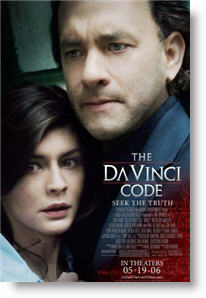
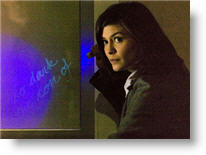
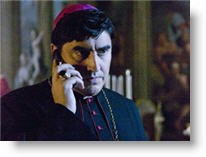
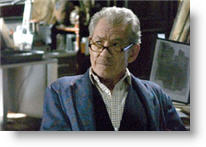
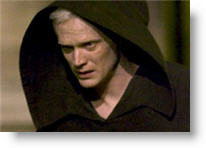
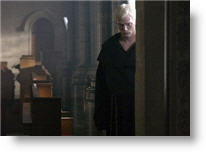
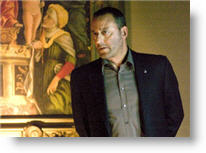
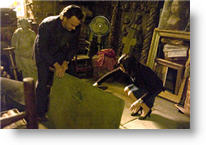
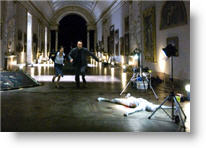
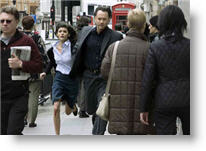
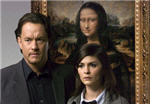
 Is THE DA VINCI CODE “the most serious assault against Christianity”? Answer
Is THE DA VINCI CODE “the most serious assault against Christianity”? Answer
Was Jesus Christ only a legend? Answer
the real Mary Magdalene
Is Jesus Christ a man, or is he God? Answer
If Jesus is God, how could he die? If Jesus died on the cross, then how can he be alive today? Answer
Was Jesus Christ God, manifest in human form? Answer
Is Jesus Christ really God? Answer
If Jesus was the Son of God, why did He call Himself the Son of Man? Answer
Trinity—How can one God be three persons? Answer
Character—Is Christ’s character consistent with his high claims? Answer
Has science disproved the miracles associated with Jesus Christ? Answer
Could Christ have sinned? Answer
Archaeology—Have any burial sites been found for the people involved in Christ’s life and death? Answer
What is “blasphemy”? Answer
How do we know the Bible is true? Answer
How can the Bible be infallible if it was written by fallible humans? Answer
“The Jesus Seminar”—Are their criticisms of the gospels valid? Answer
“The Jesus Seminar”—Who do they really speak for? Answer
| Featuring |
|---|
| Tom Hanks, Audrey Tautou, Jean Reno, Ian McKellen, Alfred Molina |
| Director |
|
Ron Howard |
| Producer |
| Brian Grazer, John Calley |
| Distributor |
“The greatest story never told”
Sequels: “Angels and Demons” (2009), “Inferno” (2016)
This is the headline that should precede every review of “The Da Vinci Code” which could possibly be the biggest box office disappointment since “King Kong”. In spite of the millions spent on advertising, I suspect that by next weekend the negative word-of-mouth reviews will sink the movie faster than the “Poseidon” is currently tanking at the box office.
First, for those unfamiliar with the book, here’s the plot. Robert Langdon (Tom Hanks) is a professor of “symbology” who stumbles onto a 2,000 year old conspiracy. In the process, he’s accused of murder and goes on the run with the lovely Sophie Neveu (Audrey Tautou). They seek out Leigh Teabing (Ian McKellen), an expert in the Gnostic gospels and all things conspiratorial. Their investigation carries them from France to England. The revelations they unearth there plunge them ever deeper into the mystery of the true origin of the Holy Grail.
Cinematically, the film looks good, but Ron Howard depends too much on documentary flashbacks to fill the backstory. Sometimes we’re in ancient Rome, sometimes we’re in France, sometimes we’re in England. Consequently, one of the problems with the movie is that the whole is less than the sum of its too many parts. The scenes lack narrative and personal tension. The most exciting—and best filmed—sequence in the movie—ensues when Sophie careens her mini car in reverse down a crowded street. Other than that, the pacing slavishly imitates the book but lacks the book’s tension. Furthermore, Howard fails to substitute a cinematic cleverness sharp enough to entertain the audience. For all practical purposes, the movie is nothing more than a lecture about how Christianity stole the “real” Jesus—visually pretty, but deadly dull.
Tom Hanks as Robert Langdon is a disaster. It’s difficult to say whether it’s Hanks’s interpretation of the role or Ron Howard’s stifling direction. Whatever the reason, Hanks looks bad, acts robotically, and remains at arm’s length from Tautou. In the book, the two end up having sex. In the movie, Robert Langdon acts as if he is Sophie’s teacher, or her older brother, or simply knows that he is too old to flirt with her and is embarrassed to show any manly feelings whatsoever. There are no compliments, no wisecracks, no arch glances. His behavior is so politically correct one is tempted to think that the movie is really “The Invasion of the Body Snatchers” and raises the question of who stole Tom Hanks and left the pod?
This is what critics mean when they complain of the lack of “chemistry” between the two and describe the movie as humorless. What they neglect to point out is that Hanks and Neveu never laugh and rarely smile. Consequently, without any casual sexual flirtation, or any evidence whatsoever that they are attracted to one another, the movie is emotionally flat and completely humorless. By comparison, Ian McKellen brings depth to his role by the revolutionary expedient of smiling and even chuckling. He takes charge of his character and animates Teabing beyond the two-dimensional cardboard cutout found in the novel. Hanks and Tautou lack the talent or the insight or the sheer acting brio to do this with their characters. Howard is to blame also. There were plenty of opportunities for him to depart from Dan Brown’s dull gospel and inject some Hollywood sparkle, but the relationship between Langdon and Neveu is so mechanical they appear to be acting with a glass wall between them or to have filmed their parts separately in front of a blue screen. Psychologically, they’re just not in the same cinematic frame.
The one bright spot in the movie is McKellen as Teabing, a scholar intent on revealing the “fraudulent” nature of Christianity. Teabing denies the divinity of Jesus and rejects the truth of the gospels. His life’s purpose is to broadcast the truth about the Catholic church’s duplicity and he does so with energy and passion. Teabing’s animus to Christianity and Judaism emerges when he says, “As long as there has been one true God there has been killing in his name.” It’s a laughable line, as if humanity in its pagan state (Genghis Khan et. al.) or in its political state (Communism, Nazism, Baathism) are innocents abroad, or that the actions of any Christian can be compared with Mao, Stalin, Pol Pot, Hitler, or Saddam Hussein. But McKellen shows why he is probably the greatest role player in film today.
Interestingly, just as Jehoiakim cut and burned the words of God (Jeremiah 36), McKellen claims to rip out the pages of Leviticus that condemn homosexuality whenever he finds a Bible in a hotel room (http://www.family.org/cforum/briefs/a0040550.cfm). It would be difficult to find a better metaphor for the movie: God out; sex in. McKellen is well-known as a gay activist and has complained about his role in the new X-Men movie because he wanted there to be a gay sex scene. He says, “It would be wonderful if the camera hovered over Magneto’s bed, to discover him making love to Professor X” (http://uk.news.yahoo.com/21042006/364/mckellen-wants-gay-sex-scene.html), a statement that will make next week’s release of the “X-Men” interesting to view.
The lovely Audrey Tautou is wasted in this part. She has the thankless job of having everything explained to her for nearly 149 excruciating minutes. She does what she can, but there’s nothing less credible than dumb beauty. Rather than enhancing the role, the role diminishes her. Even an ancient actress like Judy Dench would have been more believable because the role, as enacted in the film, calls more for the authority of smarts than it does for the authority of beauty. Having an unlovely actress play Sophie would make the final premise laughable, since divine sex (“hieros gamos”) is what the book ultimately celebrates, but the movie doesn’t elaborate on that thesis. For all its talk about sex, the movie is perversely puritanical. Sex becomes religion and religion becomes sex and the movie manages to make both boring.
It appears that Ron Howard got so caught up in the pompous material that he forgot that it is fiction, that he works in Hollywood, and that his primary responsibility is to entertain not to preach. If it were only dull, I could recommend it to Christian audiences without reservation. One would have to be an absolute blockhead to lose one’s faith as a result of watching a film so dim and convoluted. However, there are two extremely offensive scenes in the movie. These occur when Silas (Paul Bettany), the albino, stands naked in front of a crucifix of Jesus and violently flagellates himself. The homoerotic overtones in the scenes are so obvious that the intent to offend is itself offensive. It’s as if Hollywood wanted to pay Christians back for the excessive lashing of Jesus in “The Passion” with a sadomasochistic lashing to suggest a gay-themed Jesus, as in the Off-Broadway production, “Corpus Christi”.
Because of those scenes, I cannot recommend the movie for conservative Christian audiences. For those who can tolerate male nudity (albeit not frontal), the greater danger is the naked boredom they will have to endure for two and a half hours. The lesson that Christians can derive from the film is this: Jesus isn’t just a story or a set of facts; he’s a way and, more importantly, he is a life (John 14:6). The reason that the Gnostic “gospels” disappeared into the dustbins of history is because they are lies—they have no true life to animate them.
In the case of The Da Vinci Code, the book has patched together nearly two dozen bizarrely connected elements ranging from the “yin yang” of iambic pentameter (303), to silly interpretations of Da Vinci’s paintings, to heated ruminations on the meaning of circles, pentacles, roses, Gothic architecture, the Star of David, triangles, etc., and woven one big lie. It would be amusing, if so many people didn’t take the book seriously. Fortunately for Christians, it will be difficult for anyone to take the movie seriously.
Because the “The Da Vinci Code” is boring, because it is offensive, because it earnestly tries to deceive people and promotes vicious lies about the Christian faith, it would be best if no Christian saw it. Believe me, you won’t miss a thing.
Addendum
As of opening night, review ratings at Rotten Tomatoes are running 127 negative to 25 positive, an astonishing 84% negative with an overall rating below average. In other words, the movie is generating leaden reports of disappointment and derision rather than sparks of controversy and excitement. The buzz is all about the torpor of its reception rather than the stimulation of its transmission. “The Da Vinci Code” is a major flop for reasons which I’ll try to explain in order below.
There are no major spoilers in what follows, but viewers who have not read the book will have a difficult time understanding the movie without some preparation. The following points constitute the major assertions that are either explicitly stated or alluded to. (I’ve referenced their corresponding page locations in the book in parentheses.)
Major assertions of the book
Jesus was viewed as a prophet by his followers, not as the son of God, until Constantine and Council of Nicaea declared him divine in 325 A.D. (233).
Jesus and Mary Magdalene were married, uniting two Jewish royal lines (244, 248).
Jesus intended for Mary Magdalene to lead the church after his death (248).
Mary Magdalene escaped to Gaul (present day France) and gave birth to a daughter, Sarah (255).
Mary Magdalene is the real divinity, not Jesus. She is the Holy Grail which is a metaphor for “woman” and represents the ancient goddess and the “sacred feminine” (238).
The Knights Templar were ordered to retrieve the documents of proof and to protect her tomb. (They were later exterminated by an evil Pope.)
The Priory of Sion (a secret organization) worships Mary Magdalene as “the Goddess, the Holy Grail, the Rose, and the Divine Mother” (255).
The Priory of Sion is dedicated to preserving her secret, as well as protecting the descendants of Magdalene and Jesus, and the documents which prove their story, including Jesus’ own diaries (258).
The Catholic Church naturally wants to destroy all evidence in order to “rewrite history” (268).
What is not explained in the movie about the points above, but made clear in the book, are the following key false claims:
- Sex is a “spiritual act” through which spiritual knowledge (“gnosis”) is achieved (308). The followers of the “goddess” (Mary Magdalene) viewed “Orgasm as prayer” (309).
The Jewish Temple was served by female priests whose duty was to have sex with male seekers who then experienced the “divine” in the Holy of Holies through orgasm (309).
The Star of David is actually a composition of two triangles superimposed on one another and representing the male and female genitalia. Something like this: ^ and v.
The Catholic Church saw the ability of individuals to experience the divine on their own, with women, as a threat to its existence and demonized women (i.e., the sex provider) and persecuted everyone having anything to do with the Knights or the Priory.
Now, if you’ve read to this point, you’re ready to see the movie and actually understand it. But if you skipped reading all the above points, you can understand why the movie is a tedious experience for those who did not read the book. The exposition is too frequent, it’s too long, and it’s too boring.
As a counter to the misinformation given in the movie and book, I recommend readers visit one of the many sites which debunk in detail each assertion. Here are two excellent sites:
Protestant site: http://www.markdroberts.com/htmfiles/resources/davincifaq.htm
Catholic site: http://www.catholic.com/library/cracking_da_vinci_code.asp
Violence: Extreme / Profanity: Minor / Sex/Nudity: Heavy
See list of Relevant Issues—questions-and-answers.


Good / 3
…I enjoyed the movie, it is a good work of fiction that keeps you thinking and paying attention to it. When we came out of the movie everyone was saying that they thought it was great. No one was saying that they believed the lies against Christianity. …If anyone leaves this movie thinking that Christianity is all a lie it is our failure as followers of Jesus for not reaching this generation with the truth of Scripture and the Love that sent Jesus to the cross. People will only believe the lie out of ignorance and fear, not because of Brown, Howard or Hanks.
Average / 3
Moral rating: Offensive / Moviemaking quality: 3½
…Many a believer are not able to view any type of film (or read a book) that is offensive to their faith. Just as God uses his children that he has delivered from drugs, alcohol, or a life of immorality to talk to non-believers going through the same things, I believe God uses some of his children (who can go see films of this nature) to use films and books as witness tools. If you are one of these people, go see this movie so that you can discuss it with the unsaved in your life.
As a fiction story, the movie is actually quite amazing. Filmed very well, and in many beautiful locations. The acting is also done very well. The characters have a good chemistry together.
Please understand that the PG-13 rating should be strictly applied. This movie should be seen by those of us who can establish the difference between fiction and non-fiction. Children (hopefully over 13) should be talked to by their parents after the film. Please go see this film if you have been given peace in your heart from God to do so, and use it to explain the true story of Jesus’ life on this Earth. …
Average / 5
Very Offensive / 2
This book belongs to the “esoteric” genre, (a line of thought according to which a hidden lore gives the key to power) and its unreliable ideas are now being spread into the general public, thanks to Dan Brown. While lies are always a sin in the sight of God, my guess is that this maybe an opportunity for Christians to deepen their sometimes insufficient knowledge of the history of Christianity, and find out that our faith has in truth nothing to fear from historical investigations. Concerning the spiritual content of the movie, I have to underline that we are—of course!—faced with pure blasphemy. Near the end of the movie, we are treated to a dialogue between Hanks (Langdon) and Tautou (Neveu / Saint Clair) which reveals the purpose of the whole story: Jesus, says Hanks, was an inspiring man, …(read: nothing more than a mere man) (quoted from memory). Fools! If Christ was a mere man, he did not rise again, and as Paul said, our faith is vain…
Extremely Offensive / 2
Extremely Offensive
However, while the book was mediocre, the movie was downright HORRIBLE! It was boring and contained virtually none of the plot exposition that the book had. The only point of the movie I did like was when Robert and Sophie were at the home of Sir Lee Teabing. When Sir Lee was explaining the Grail mythology, Langdon actually spoke up and defended Christ’s divinity and kept trying to say that the mind sees what it wants to see.
Basically, the story poses the theory that Jesus had children with Mary Magdalene and that their bloodline continues to this day through certain French nobility. Hence, the “chalice that caught the blood of Christ” was quite literally Mary Magdalene’s womb. Mary Magdalene is/was the Holy Grail?! The secret was passed down from generation to generation by a secret society known as the Priory of Sion. King Arthur’s knights went on crusades to search for the Grail and their search allegedly turned into goddess worship as they revered Magdalene as “The Sacred Feminine.” Some famous Grand Masters of the Priory have included Sir Isaac Newton and (of course) Leonardo Da Vinci. Da Vinci has apparently included hints to this “truth” in his work. Does the disciple to the right of Jesus (leaning away from Him) in the painting of “The Last Supper” look feminine? Only because someone pointed it out to me. Could it be Mary Magdalene? I dunno. I didn’t know we were given a seating chart for the Last Supper. How am I supposed to know who’s sitting where? But like the movie points out—the mind sees what it wants to see.
Once again, I’ll leave this thought—the book was mediocre and the movie was worse. I really despise movies that are based on books where you have to have read the book in order to understand the movie. That’s very poor and uncreative directing. I would have expected better from Ron Howard.
Offensive / 1
Very Offensive / 2
Extremely Offensive / 2
Offensive / 2
Extremely Offensive / 1
They base the their theory on Davinci’s painting “The Last Supper.” They act like the painting was a portrait of the last supper, as if Davinci was there painting it. The fact is, Davinci was born over 1,300 years after the death of Christ. The painting was Leonardo’s interpretation. And, where in the Bible does it say that Mary Magdalene was Jesus’ wife? It says that she was his “companion,” but the book that they referred to was not written in Greek, but in Aramaic. The Greek translation of “companion” literally means “Spouse.” But, the Aramaic translation actually means “friend.” I think that when Leonardo painting the female-looking person in his painting, he was painting John. The Bible said that John was a beautiful man. A beautiful man possesses feminine traits. Also, in the picture, how many people were there? The answer is 13. That means that if Jesus and all twelve disciples were there, there would be no room left for Mary. Again, this movie was very well done, and it brings up great spiritual topics to discuss, but I encourage you; unless you are strong in your faith and cannot be moved, do not see this movie. It will challenge you a great amount. …
Offensive / 4
The whole movie makes you question a number of things—especially non-Christians. One of the topics was a painting of Da Vinci’s “The Lord’s Supper.” The man to the right is said to be a woman in the movie, Mary Magdalene. Which is not true. Leonardo Da Vinci himself stated that they were all men—my Mom had known being a professional artist. The whole movie is based on the fact that Jesus and Mary Magdalene had a sexual relationship. Example, when Jesus was on the cross they led you to believe that she was pregnant with a daughter from Jesus. She falsely gave birth after his death, and the blood line carried on until now. The woman in the film finds out that she is the last descendant of Mary the wife of Jesus. Which is why the man who was beating himself wanted to kill her. This is found out after actor Tom Hanks and the woman break the code. They are constantly being chased by the man who I previously mentioned. He tries to kill them but along the way he kills a nun, a priest, and others.
I would recommend for you only to see this movie as a chance to witness to those who have believed Hollywood. Tom Hanks has claimed to be a Christian after he got saved, so this makes people wonder even more. I wouldn’t watch this movie again, but if you decide to see this film then as a warning, it is very serious, and I strongly encourage you as a devout Christian to read the Christian book on The Da Vinci Code. I got a CD from my pastor that made me even more solid and prepared to explain my faith…
Extremely Offensive / 3
Extremely Offensive / 3
Offensive / 3
Very Offensive / 3


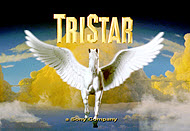
My Ratings: Offensive / 4